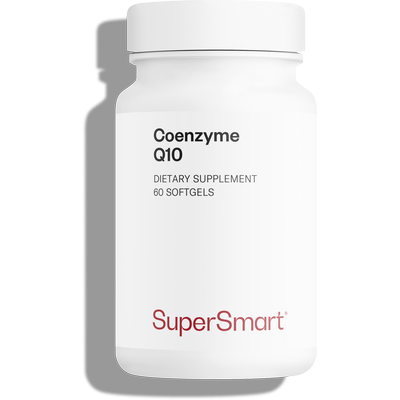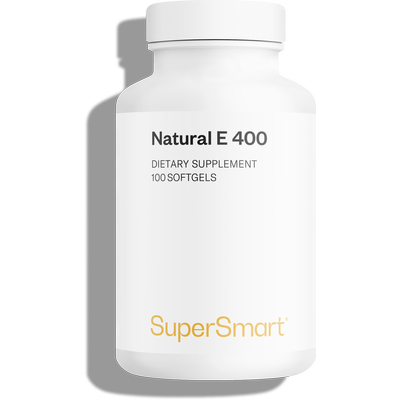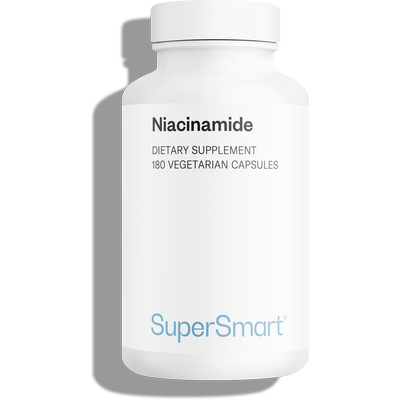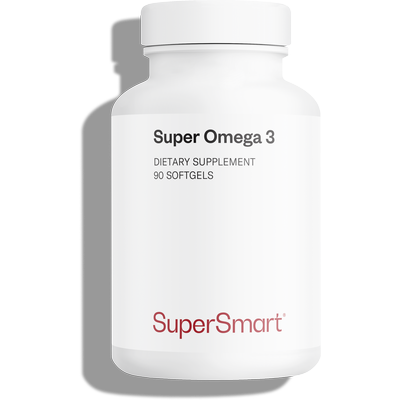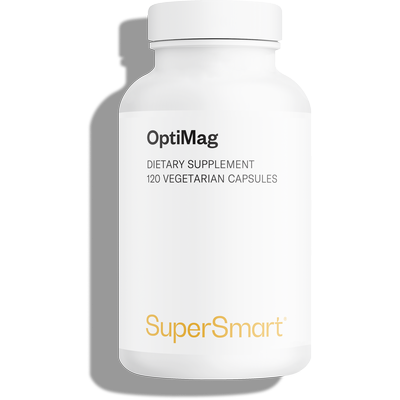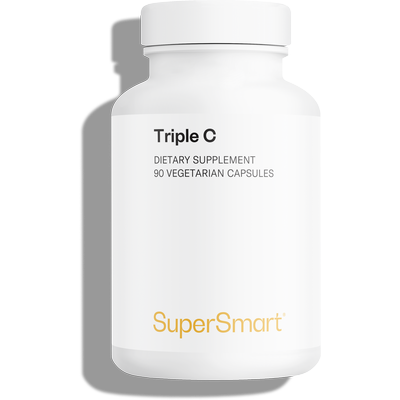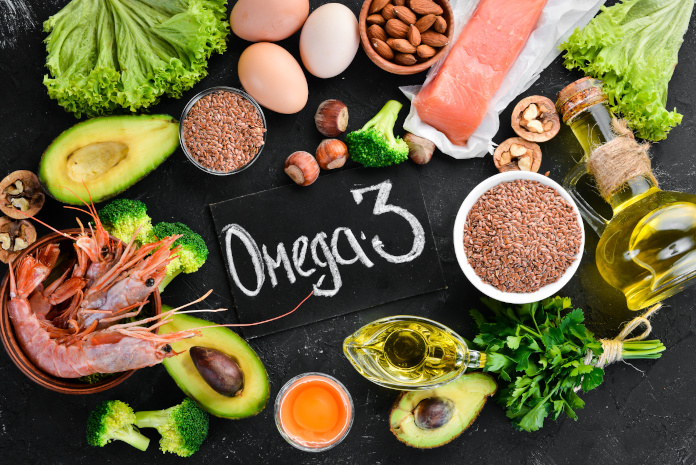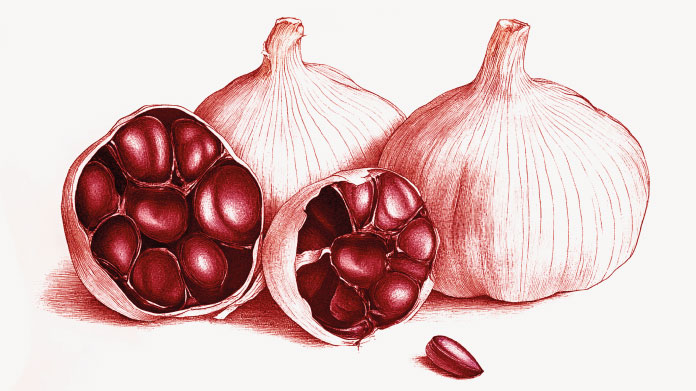Phlebitis: what to eat and what not to eat
Phlebitis is inflammation of a vein, often caused by a blood clot. Which foods can help prevent it and which should definitely be avoided by sufferers?

Phlebitis: what exactly is it?
Phlebitis, sometimes known as superficial vein thrombosis, is a vascular disease usually characterised by the formation of a blood clot (thrombus) in a vein, often in the legs.
When it affects a vein close to the surface of the skin, it is referred to as superficial thrombophlebitis (1). Often visible and palpable on the skin’s surface, the vein is hard to the touch and inflamed, producing a sensation of heat.
Though complications tend to be minor, it can sometimes coexist with a deep vein thrombosis, a much more serious condition. This occurs when a larger vein within a muscle becomes obstructed (2).
Symptoms are not always obvious but include swelling or hardening in one leg, usually the calf or foot, a feeling of heaviness and blueish/purplish discoloration of the affected area. If the clot is not dissolved, it can break away from the vein wall and travel to the lungs, causing a life-threatening pulmonary embolism, which requires immediate medical attention (3).
Phlebitis: foods approved for preventing it
While there is no miracle diet for treating phlebitis (if you are at all concerned, consult a doctor), it’s well worth adopting a balanced diet with plenty of protective nutrients as a preventive measure.
It has long been established that a diet rich in omega-3 offers significant benefits (4). The fatty acids EPA and DHA, found almost exclusively in oily fish, help to maintain healthy cardiac function and normal blood pressure, two factors that reduce the risk of blood clot formation (the supplement Super Omega 3 combines EPA and DHA in a highly-stable and purified formulation, free from all traces of pollutants) (5).
The plant precursor of these two omega-3s, ALA, found in walnuts, rapeseed oil and flaxseed oil, is also beneficial for helping to maintain normal cholesterol levels (6).
Plant-source foods from the Alliaceae family such as garlic and onions also support good vascular and venous health through a blood-thinning effect, as a result of their very high content of sulphur-containing compounds (7-8).
Flavonoids are thought to play a role in strengthening vein walls. They are found in red berries (such as blackcurrants), citrus fruits and plants that promote good circulation such as red vine leaf (9).
It’s also important to ensure you meet your daily requirements for vitamin C (lemons, kiwi fruit, peppers …) and vitamin E (almonds, avocados…), both of which modulate markers of haemostasis. While supplementation is not recommended for those with diagnosed phlebitis, it can be considered at the first signs of ‘sluggish veins’ (try Triple C and Natural E400 for example) (10-11).
A study has also looked at the effects of vitamin B3 (niacin) in stabilising arterial deposits in individuals with hypercholesterolaemia who are more prone to thrombotic events (12). Offal, turkey and duck, as well as oily fish, nuts and nutritional yeast, all contain substantial amounts (the vitamin can be found at higher levels in the supplement Niacinamide).
Studies on stable coronary patients suggest that magnesium may have an influence on the mechanisms of platelet aggregation, which is involved in the formation of blood clots (13). For a good intake of this mineral, make sure you consume cocoa, wholegrain rice and nuts (magnesium deficiency being very common, supplementing with a product such as OptiMag can help boost your intake).
Research has also investigated interactions between coenzyme Q10, found in beef, herrings, chicken and sardines, and platelet activity (in the supplement Coenzyme Q10, its uptake is maximised by combining it with tocopherols and lipids) (14).
Finally, a number of clinical reports suggest a link between vitamin D deficiency and an increase in thrombotic episodes, although more in-depth investigations are needed to clarify the reasons for this (15-16). During winter, when we have less exposure to sunlight, it may be wise to take a supplement (try, for example, Vitamin D3 5000 IU, delivered in oil-based capsules for optimal absorption).
Thrombosis: which foods should you avoid?
Foods bad for the circulation
From both a preventive and therapeutic perspective, it’s essential to limit foods which oxidise ‘bad’ LDL-cholesterol and hasten the formation of atheromatous plaques, a predisposing factor in blood clots. The main culprits here are saturated fats (red meat, charcuterie, butter, too much cheese…), as well as sugars (17-18).
Excessive sodium intake paves the way for hypertension, associated with a higher risk of thrombosis. Indeed the WHO recommends an intake of less than 5g of salt a day (around one teaspoon), from all sources combined (19).
It should also be noted that alcohol and coagulants don’t mix and that smoking promotes blood clotting and inflammation of the blood vessels (20-21).
Phlebitis and coffee
The link between phlebitis and coffee is controversial. A 2012 case-controlled study argued that there is an association between coffee consumption and a lower risk of vein thrombosis (22), suggesting it may, in particular, mediate specific coagulation factors (von Willebrand and VIII).
However, a 2015 meta-analysis qualified this conclusion by suggesting there is a dose-response relationship. Modest coffee consumption (1-4 cups a day) may be associated with an 11% increased risk of venous thromboembolism compared with abstainers, whereas a higher intake (≥ 5 cups/day) may be correlated with a 25% decreased risk (23). Clearly the subject is still under discussion.
Taking oral anticoagulants: look out for interactions
Treatment of deep vein thrombosis is based on administering anticoagulants, initially in the form of subcutaneous injections (heparin and derivatives), and subsequently oral medication (often antivitamin K tablets). It’s important to get the dose right to ensure the treatment is effective while at the same time minimising the risk of bleeding (24).
These treatments are actually very sensitive to food and drug interactions. Medical advice should always be sought, therefore, before undertaking any supplementation.
If you’re taking antivitamin K medication, it’s important to control your dietary intake of vitamin K so as not to destabilise the treatment and impair its efficacy. The richest dietary sources of vitamin K include:
- rapeseed oil, soya oil and their derivatives (margarine);
- green vegetables: spinach, lettuce, watercress, green beans, parsley … ;
- fennel, asparagus, leeks;
- cruciferous vegetables: cabbage, cauliflower, Brussels sprouts, broccoli, radishes, turnips...
The advice is to eat small amounts of these foods regularly (one serving a day), rather than large amounts occasionally (25). If in doubt about a particular food, discuss it with your GP or your phlebologist.
SUPERSMART ADVICE
References
- Czysz A, Higbee SL. Superficial Thrombophlebitis. [Updated 2023 Jan 2]. In: StatPearls [Internet]. Treasure Island (FL): StatPearls Publishing; 2023 Jan-. Available from: https://www.ncbi.nlm.nih.gov/books/NBK556017/
- Waheed SM, Kudaravalli P, Hotwagner DT. Deep Vein Thrombosis. [Updated 2023 Jan 19]. In: StatPearls [Internet]. Treasure Island (FL): StatPearls Publishing; 2023 Jan-. Available from: https://www.ncbi.nlm.nih.gov/books/NBK507708/
- Vyas V, Goyal A. Acute Pulmonary Embolism. [Updated 2022 Aug 8]. In: StatPearls [Internet]. Treasure Island (FL): StatPearls Publishing; 2023 Jan-. Available from: https://www.ncbi.nlm.nih.gov/books/NBK560551/
- DiNicolantonio JJ, OKeefe J. Importance of maintaining a low omega-6/omega-3 ratio for reducing platelet aggregation, coagulation and thrombosis. Open Heart. 2019 May 2;6(1):e001011. doi: 10.1136/openhrt-2019-001011. PMID: 31218005; PMCID: PMC6546183.
- Golanski J, Szymanska P, Rozalski M. Effects of Omega-3 Polyunsaturated Fatty Acids and Their Metabolites on Haemostasis-Current Perspectives in Cardiovascular Disease. Int J Mol Sci. 2021 Feb 27;22(5):2394. doi: 10.3390/ijms22052394. PMID: 33673634; PMCID: PMC7957531.
- Saeedi Saravi SS, Bonetti NR, Pugin B, Constancias F, Pasterk L, Gobbato S, Akhmedov A, Liberale L, Lüscher TF, Camici GG, Beer JH. Lifelong dietary omega-3 fatty acid suppresses thrombotic potential through gut microbiota alteration in aged mice. iScience. 2021 Jul 22;24(8):102897. doi: 10.1016/j.isci.2021.102897. PMID: 34401676; PMCID: PMC8355916.
- Vazquez-Prieto MA, Rodriguez Lanzi C, Lembo C, Galmarini CR, Miatello RM. Garlic and onion attenuates vascular inflammation and oxidative stress in fructose-fed rats. J Nutr Metab. 2011;2011:475216. doi: 10.1155/2011/475216. Epub 2011 Aug 25. PMID: 21876795; PMCID: PMC3163016.
- Fakhar H, Hashemi Tayer A. Effect of the Garlic Pill in comparison with Plavix on Platelet Aggregation and Bleeding Time. Iran J Ped Hematol Oncol. 2012;2(4):146-52. Epub 2012 Sep 22. PMID: 24575255; PMCID: PMC3915434.
- Vazhappilly CG, Ansari SA, Al-Jaleeli R, Al-Azawi AM, Ramadan WS, Menon V, Hodeify R, Siddiqui SS, Merheb M, Matar R, Radhakrishnan R. Role of flavonoids in thrombotic, cardiovascular, and inflammatory diseases. 2019 Oct;27(5):863-869. doi: 10.1007/s10787-019-00612-6. Epub 2019 Jul 15. PMID: 31309484.
- Morelli MB, Gambardella J, Castellanos V, Trimarco V, Santulli G. Vitamin C and Cardiovascular Disease: An Update. Antioxidants (Basel). 2020 Dec 3;9(12):1227. doi: 10.3390/antiox9121227. PMID: 33287462; PMCID: PMC7761826.
- Garg A, Lee JC. Vitamin E: Where Are We Now in Vascular Diseases? Life (Basel). 2022 Feb 18;12(2):310. doi: 10.3390/life12020310. PMID: 35207597; PMCID: PMC8874674.
- Rosenson RS. Antiatherothrombotic effects of nicotinic acid. Atherosclerosis. 2003 Nov;171(1):87-96. doi: 10.1016/j.atherosclerosis.2003.07.003. PMID: 14642410.
- Shechter M, Merz CN, Paul-Labrador M, Meisel SR, Rude RK, Molloy MD, Dwyer JH, Shah PK, Kaul S. Oral magnesium supplementation inhibits platelet-dependent thrombosis in patients with coronary artery disease. Am J Cardiol. 1999 Jul 15;84(2):152-6. doi: 10.1016/s0002-9149(99)00225-8. PMID: 10426331.
- Wang R, Chen Y, Tian Z, Zhu M, Zhang B, Du S, Li Y, Liu Z, Hou S, Yang Y. Coenzyme Q10 Attenuates Human Platelet Aggregation Induced by SARS-CoV-2 Spike Protein via Reducing Oxidative Stress In Vitro. Int J Mol Sci. 2022 Oct 15;23(20):12345. doi: 10.3390/ijms232012345. PMID: 36293203; PMCID: PMC9604356.
- Khademvatani K, Seyyed-Mohammadzad MH, Akbari M, Rezaei Y, Eskandari R, Rostamzadeh A. The relationship between vitamin D status and idiopathic lower-extremity deep vein thrombosis. Int J Gen Med. 2014 Jun 19;7:303-9. doi: 10.2147/IJGM.S64812. PMID: 24971035; PMCID: PMC4069050.
- Mohammad S, Mishra A, Ashraf MZ. Emerging Role of Vitamin D and its Associated Molecules in Pathways Related to Pathogenesis of Thrombosis. 2019 Oct 24;9(11):649. doi: 10.3390/biom9110649. PMID: 31653092; PMCID: PMC6920963.
- Nordøy A, Goodnight SH. Dietary lipids and thrombosis. Relationships to atherosclerosis. Arteriosclerosis. 1990 Mar-Apr;10(2):149-63. doi: 10.1161/01.atv.10.2.149. PMID: 2180393.
- Undas A, Wiek I, Stêpien E, Zmudka K, Tracz W. Hyperglycemia is associated with enhanced thrombin formation, platelet activation, and fibrin clot resistance to lysis in patients with acute coronary syndrome. Diabetes Care. 2008 Aug;31(8):1590-5. doi: 10.2337/dc08-0282. Epub 2008 May 16. PMID: 18487475; PMCID: PMC2494657.
- Grillo A, Salvi L, Coruzzi P, Salvi P, Parati G. Sodium Intake and Hypertension. 2019 Aug 21;11(9):1970. doi: 10.3390/nu11091970. PMID: 31438636; PMCID: PMC6770596.
- Reddiess P, Aeschbacher S, Meyre P, Coslovsky M, Kühne M, Rodondi N, Baretella O, Beer JH, Kobza R, Moschovitis G, Di Valentino M, Müller C, Steiner F, Bonati LH, Sticherling C, Osswald S, Conen D; BEAT-AF and Swiss-AF investigators. Alcohol consumption and risk of cardiovascular outcomes and bleeding in patients with established atrial fibrillation. 2021 Jan 25;193(4):E117-E123. doi: 10.1503/cmaj.200778. PMID: 33667180; PMCID: PMC7954562.
- Hung J, Lam JY, Lacoste L, Letchacovski G. Cigarette smoking acutely increases platelet thrombus formation in patients with coronary artery disease taking aspirin. 1995 Nov 1;92(9):2432-6. doi: 10.1161/01.cir.92.9.2432. PMID: 7586342.
- Roach RE, Siegerink B, le Cessie S, Rosendaal FR, Cannegieter SC, Lijfering WM. Coffee consumption is associated with a reduced risk of venous thrombosis that is mediated through hemostatic factor levels. J Thromb Haemost. 2012 Dec;10(12):2519-25. doi: 10.1111/jth.12034. PMID: 23083056.
- Lippi G, Mattiuzzi C, Franchini M. Venous thromboembolism and coffee: critical review and meta-analysis. Ann Transl Med. 2015 Jul;3(11):152. doi: 10.3978/j.issn.2305-5839.2015.06.14. PMID: 26244139; PMCID: PMC4499668.
- Amaraneni A, Chippa V, Rettew AC. Anticoagulation Safety. [Updated 2023 Apr 17]. In: StatPearls [Internet]. Treasure Island (FL): StatPearls Publishing; 2023 Jan-. Available from: https://www.ncbi.nlm.nih.gov/books/NBK519025/
- Violi F, Lip GY, Pignatelli P, Pastori D. Interaction Between Dietary Vitamin K Intake and Anticoagulation by Vitamin K Antagonists: Is It Really True?: A Systematic Review. Medicine (Baltimore). 2016 Mar;95(10):e2895. doi: 10.1097/MD.0000000000002895. PMID: 26962786; PMCID: PMC4998867.
Keywords
61 Days
Very happy with the order and the…
Very happy with the order and the prompt team's response to an identified issue with my order.
KUQI Fatmir
68 Days
15 + years as a customer
I have been using their products for over 15 years as I find both the quality and pricing excellent.
Del Chandler
70 Days
Good quick delivery
Good quick delivery
Timothy O Shea
71 Days
Good service
Good communication following order. Product came within the time frame and was well packaged. The only confusing thing I found was in checking out. For some reason it is not clear how to do so and the current system should be improved.
Joe O Leary
80 Days
Simple and fast.
Simple and fast.
Nina
80 Days
Great product was definitely what is…
Great product was definitely what is says and arrived on without issue
customer
86 Days
I love reading those product facts on…
I love reading those product facts on Supersmart.com. Effective health products making permanent changes to my blood-work results and testes. However, I also have to order capsules from other websites.
NORDGULEN Olav
89 Days
Great products
Great products Very easy to choose, to order… and to get at home
Federica mastrojanni
92 Days
Service rapide et bons produits
Service rapide et bons produits
customer
93 Days
Good products and fast delivery
Good products and fast delivery
Trusted
98 Days
Does what it says on the can
I believe in this product Made to highest standard The ordering process is straightforward Delivery time prompt Excellent product, excellent service Happy customer ❤️
Sheba Kelleher
103 Days
Excellents produits
Excellents produits. Rien à dire si ce n'est qu'ils sont très chèrs.
MJS_France
105 Days
Very good supplement
Very good supplement
Glaveash
106 Days
Supersmart supplements are really…effective
Supersmart supplements are really effective and have helped me and family members and friends to improve their health including some of us with severe health problems including some with no existing medical treatment.
Anne Georget
107 Days
SuperBig Supersmart
SuperBig Supersmart
Pierre

